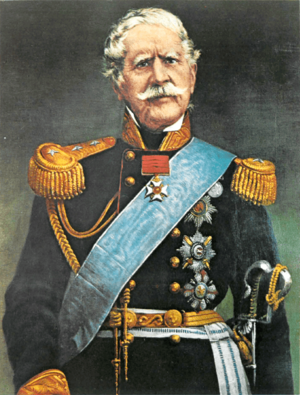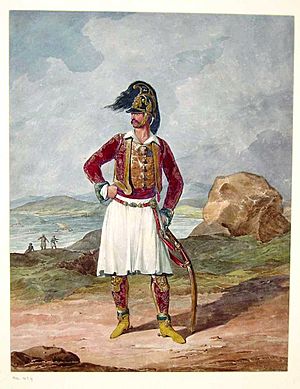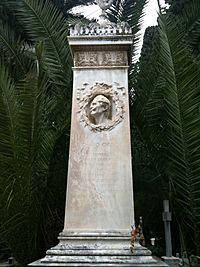Richard Church (general) facts for kids
Sir Richard Church CB GCH (Greek: Ριχάρδος/Ρίτσαρντ Τσούρτς/Τσωρτς; 23 February 1784 – 20 March 1873) was an Irish soldier. He served in the British Army and later became a leader of the Greek forces. This was during the final parts of the Greek War of Independence after 1827. After Greece became independent, he became a general in the Hellenic Army. He also served as a member of the Greek Senate.
Quick facts for kids
Sir
Richard Church
CB GCH
|
|
|---|---|

Church as a general in the Hellenic Army
|
|
| Senator | |
| In office 1844–1845 |
|
| Monarch | Otto |
| Personal details | |
| Born | 23 February 1784 Cork, United Kingdom (now Republic of Ireland) |
| Died | 20 march 1873 Athens, Kingdom of Greece |
| Resting place | First Cemetery of Athens |
| Spouse | Marie-Anne Wilmot |
| Relations | Richard William Church (nephew) |
| Awards | |
| Military service | |
| Allegiance | |
| Branch/service | |
| Years of service | 1800-1829 1833-1854 |
| Rank | Lieutenant-Colonel (British Army) Lieutenant General (Sicilian Army) General (Hellenic Army) |
| Unit | Somerset Light Infantry Royal Corsican Rangers 1st Regiment Greek Light Infantry 2nd Regiment Greek Light Infantry |
| Battles/wars | French Revolutionary Wars
|
Contents
Early Life and Military Career
Richard Church was born in Cork, Ireland, in 1784. His father was a merchant. At just 16 years old, Richard decided to join the British Army. His father helped him get a special position as an officer in 1800.
He served in Egypt in 1801, fighting in the Battle of Abukir. After that, he went to the Mediterranean Sea in 1805. He fought against the French in Italy at the Battle of Maida in 1806. Here, he showed he was good at leading soldiers.
Leading Greek Soldiers
In 1809, Richard Church helped the British take over the Ionian Islands. These islands were controlled by the French. He became famous for creating a Greek army unit that was paid by the British.
He became a Major in the 1st Regiment Greek Light Infantry in 1809. Later, in 1812, he became a Lieutenant-Colonel. He even formed a second Greek regiment in 1813. Many of the Greek soldiers he trained later became important leaders in the Greek War of Independence. During a battle to take the island of Santa Maura, he was badly injured in his left arm.
After recovering, he traveled through northern Greece. He also worked as a British military representative with Austrian troops. He helped push the French out of Naples. When the wars ended, he was honored for his service.
Service in Naples
In 1817, he joined the army of King Ferdinand of Naples. His job was to stop bandits in a region called Apulia. He was very successful at this. In 1820, he became the commander of troops in Sicily. However, a revolution started, and he had to leave. He was even put on trial but was found innocent. King George IV of the United Kingdom honored him in 1822.
Helping Greece Gain Independence
Richard Church strongly supported the Greeks when they rose up against the Turks. In 1827, he took a big step: he became the commander-in-chief of the Greek army.
At this time, the Greek army was not well-organized. They needed help from other countries. Sir Richard Church arrived in Greece in March 1827. He was made the supreme commander on April 15, 1827. But he found it hard to get the Greek forces to work together.
His army tried to help the acropolis of Athens, which was under attack. But they were defeated. The Acropolis then surrendered. After this, Sir Richard focused on smaller, more local battles in western Greece.
After a big naval battle called the Battle of Navarino, he became the commander of the Greek regular forces in Central Greece. However, he resigned in 1829 because he disagreed with the Greek government at the time. He chose to live in Greece for the rest of his life.
Life in Independent Greece
Richard Church's work helped Greece a lot. He helped to set the borders of Greece in 1832. This was good for Greece.
Under King Otto, he held important military jobs. In 1833, he became a lieutenant general in the Hellenic Army. In 1835, he commanded the forces in mainland Greece. He also served as the Army Minister for a short time. From 1844 to 1845, he was a senator. In 1854, he was promoted to full general. This was the first time someone held this rank in the Hellenic Army.
Family Life
Sir Richard Church married Marie-Anne Wilmot in 1826. He was the uncle of a famous English churchman and writer named Richard William Church.
Death and Legacy
Sir Richard Church passed away in Athens in 1873 after an illness. He was buried at the First Cemetery of Athens. His funeral was paid for by the public. It was a big event with King George I and many important guests.
His grave has a special message in English and Greek. It says he gave everything to help the Greek people gain freedom. It also says he lived for Greece and died among its people.
 | Bessie Coleman |
 | Spann Watson |
 | Jill E. Brown |
 | Sherman W. White |



